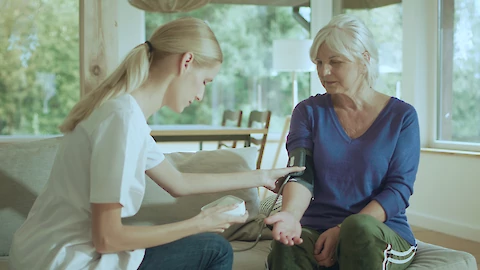
Caring for a senior loved one is a profound commitment, often requiring a broad understanding of health matters. One topic that often comes into play is blood pressure. At Senior Helpers Northern Utah, we understand the demands this puts on caregivers. Our guide will equip you with fundamental knowledge about blood pressure, its regular monitoring, and how to manage it effectively.
Blood Pressure Explained
Before delving into the specifics, let's cover the basics of blood pressure. Blood pressure is the force exerted by your blood against your arterial walls as it moves through your body. It's measured in two numbers: systolic (top number) and diastolic (bottom number). Normal blood pressure for seniors typically ranges around 120/80 mmHg. However, the "normal" range may sometimes differ as per individual health conditions and doctor's recommendations.
Importance of Regular Blood Pressure Monitoring
It’s crucial to be vigilant about the regular monitoring of blood pressure in seniors. Both high and low blood pressure could lead to serious health problems. High blood pressure, or hypertension, may increase the risk of heart disease, stroke, and kidney disease. On the other hand, low blood pressure, or hypotension, can result in dizziness, fainting, and, in severe cases, inadequate blood flow to vital organs.
As a family caregiver, monitoring your senior loved one's blood pressure regularly can help detect any issues early and put preventive measures or treatments in place promptly. If you or your senior loved one exhibits any of these symptoms, contact a healthcare provider immediately.
Tips for Maintaining Healthy Blood Pressure Levels
There are several strategies to keep blood pressure levels in check. Diet plays a pivotal role. A diet rich in fruits, vegetables, lean meats, and low-fat dairy can help manage blood pressure. Limiting sodium and alcohol intake, along with processed foods, can also prove beneficial.
Regular physical activity can likewise aid in maintaining healthy blood pressure. Even light activities like gentle walks or chair exercises can make a difference. Just make sure to talk to your doctor before starting a new fitness routine.
If prescribed, medications should be taken as directed to help manage blood pressure effectively. Finally, stress management is critical. Relaxing activities such as reading, gardening, or mindfulness techniques can help alleviate stress, subsequently helping control blood pressure.
Role of In-Home Care in Blood Pressure Management
In-home care from Senior Helpers Northern Utah can play a role in blood pressure management. Our trained caregivers can help ensure regular blood pressure monitoring, aid with medication reminders, and assist with dietary planning and meal preparation that meets your loved one's nutritional needs.
Discover Compassionate Senior Care
Understanding and effectively managing blood pressure is a fundamental aspect of senior care. It's a responsibility that may seem challenging, but with the right knowledge and support, it is manageable. If you’re a family caregiver in Logan, Ogden, Smithfield, Roy, and Brigham City, remember that you're not alone in this journey—Senior Helpers Northern Utah is here to assist. Contact us to learn more about our senior care services!